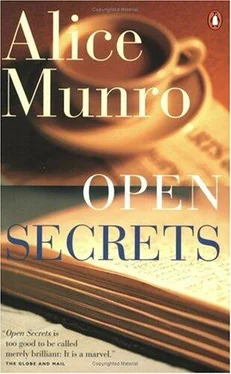But Muriel, when she came out on the veranda in her high heels and slinky crêpe, cried out at once, “Oh, my favorite drink! Gin and lemon!” She took a sip and pouted at Porter. “You did it again. You forgot the gin again!” Then she teased the minister, asking if he didn’t have a flask in his pocket. The minister was gallant, or perhaps made reckless by boredom. He said he wished he had.
The visitor who rose to be introduced was tall and thin and sallow, with a face that seemed to hang in pleats, precise and melancholy. Muriel did not give way to disappointment. She sat down beside him and tried in a spirited way to get him into conversation. She told him about her music-teaching and was scathing about the local choirs and musicians. She did not spare the Anglicans. She twitted the minister and Porter, and told about the live chicken that walked onto the stage during a country school concert.
Porter had done the chores early, washed and changed into his suit, but he kept looking uneasily toward the barnyard, as if he recalled something that was left undone. One of the cows was bawling loudly in the field, and at last he excused himself to go and see what was wrong with her. He found that her calf had got caught in the wire fence and managed to strangle itself. He did not speak of this loss when he came back with newly washed hands. “Calf caught up in the fence” was all he said. But he connected the mishap somehow with this entertainment, with dressing up and having to eat off your knees. He thought that was not natural.
“Those cows are as bad as children,” Millicent said. “Always wanting your attention at the wrong time!” Her own children, fed earlier, peered from between the bannisters to watch the food being carried to the veranda. “I think we will have to commence without Dorrie. You men must be starving. This is just a simple little buffet. We sometimes enjoy eating outside on a Sunday evening.”
“Commence, commence!” cried Muriel, who had helped to carry out the various dishes — the potato salad, carrot salad, jellied salad, cabbage salad, the devilled eggs and cold roast chicken, the salmon loaf and warm biscuits, and relishes. Just when they had everything set out, Dorrie came around the side of the house, looking warm from her walk across the field, or from excitement. She was wearing her good summer dress, a navy-blue organdie with white dots and white collar, suitable for a little girl or an old lady. Threads showed where she had pulled the torn lace off the collar instead of mending it, and in spite of the hot day a rim of undershirt was hanging out of one sleeve. Her shoes had been so recently and sloppily cleaned that they left traces of whitener on the grass.
“I would have been on time,” Dorrie said, “but I had to shoot a feral cat. She was prowling around my house and carrying on so. I was convinced she was rabid.”
She had wet her hair and crimped it into place with bobby pins. With that, and her pink shiny face, she looked like a doll with a china head and limbs attached to a cloth body, firmly stuffed with straw.
“I thought at first she might have been in heat, but she didn’t really behave that way. She didn’t do any of the rubbing along on her stomach such as I’m used to seeing. And I noticed some spitting. So I thought the only thing to do was to shoot her. Then I put her in a sack and called up Fred Nunn to see if he would run her over to Walley, to the vet. I want to know if she really was rabid, and Fred always likes the excuse to get out in his car. I told him to leave the sack on the step if the vet wasn’t home on a Sunday night.”
“I wonder what he’ll think it is?” said Muriel. “A present?”
“No. I pinned on a note, in case. There was definite spitting and dribbling.” She touched her own face to show where the dribbling had been. “Are you enjoying your visit here?” she said to the minister, who had been in town for three years and had been the one to bury her brother.
“It is Mr. Speirs who is the visitor, Dorrie,” said Millicent. Dorrie acknowledged the introduction and seemed unembarrassed by her mistake. She said that the reason she took it for a feral cat was that its coat was all matted and hideous, and she thought that a feral cat would never come near the house unless it was rabid.
“But I will put an explanation in the paper, just in case. I will be sorry if it is anybody’s pet. I lost my own pet three months ago — my dog Delilah. She was struck down by a car.”
It was strange to hear that dog called a pet, that big black Delilah who used to lollop along with Dorrie all over the countryside, who tore across the fields in such savage glee to attack cars. Dorrie had not been distraught at the death; indeed she had said she had expected it someday. But now, to hear her say “pet,” Millicent thought, there might have been grief she didn’t show.
“Come and fill up your plate or we’ll all have to starve,” Muriel said to Mr. Speirs. “You’re the guest, you have to go first. If the egg yolks look dark it’s just what the hens have been eating — they won’t poison you. I grated the carrots for that salad myself, so if you notice some blood it’s just where I got a little too enthusiastic and grated in some skin off my knuckles. I had better shut up now or Millicent will kill me.”
And Millicent was laughing angrily, saying, “Oh, they are not! Oh, you did not !”
Mr. Speirs had paid close attention to everything Dorrie said. Maybe that was what had made Muriel so saucy. Millicent thought that perhaps he saw Dorrie as a novelty, a Canadian wild woman who went around shooting things. He might be studying her so that he could go home and describe her to his friends in England.
Dorrie kept quiet while eating and she ate quite a lot. Mr. Speirs ate a lot too — Millicent was happy to see that — and he appeared to be a silent person at all times. The minister kept the conversation going describing a book he was reading. It was called The Oregon Trail .
“Terrible the hardships,” he said.
Millicent said she had heard of it. “I have some cousins living out in Oregon but I cannot remember the name of the town,” she said. “I wonder if they went on that trail.”
The minister said that if they went out a hundred years ago it was most probable.
“Oh, I wouldn’t think it was that long,” she said. “Their name was Rafferty.”
“Man the name of Rafferty used to race pigeons,” said Porter, with sudden energy. “This was way back, when there was more of that kind of thing. There was money going on it, too. Well, he sees he’s got a problem with the pigeons’ house, they don’t go in right away, and that means they don’t trip the wire and don’t get counted in. So he took an egg one of his pigeons was on, and he blew it clear, and he put a beetle inside. And the beetle inside made such a racket the pigeon naturally thought she had an egg getting ready to hatch. And she flew a beeline home and tripped the wire and all the ones that bet on her made a lot of money. Him, too, of course. In fact this was over in Ireland, and this man that told the story, that was how he got the money to come out to Canada.”
Millicent didn’t believe that the man’s name had been Rafferty at all. That had just been an excuse.
“So you keep a gun in the house?” said the minister to Dorrie. “Does that mean you are worried about tramps and suchlike?”
Dorrie put down her knife and fork, chewed something up carefully, and swallowed. “I keep it for shooting,” she said.
After a pause she said that she shot groundhogs and rabbits. She took the groundhogs over to the other side of town and sold them to the mink farm. She skinned the rabbits and stretched the skins, then sold them to a place in Walley which did a big trade with the tourists. She enjoyed fried or boiled rabbit meat but could not possibly eat it all herself, so she often took a rabbit carcass, cleaned and skinned, around to some family that was on Relief. Many times her offering was refused. People thought it was as bad as eating a dog or a cat. Though even that, she believed, was not considered out of the way in China.
Читать дальше












